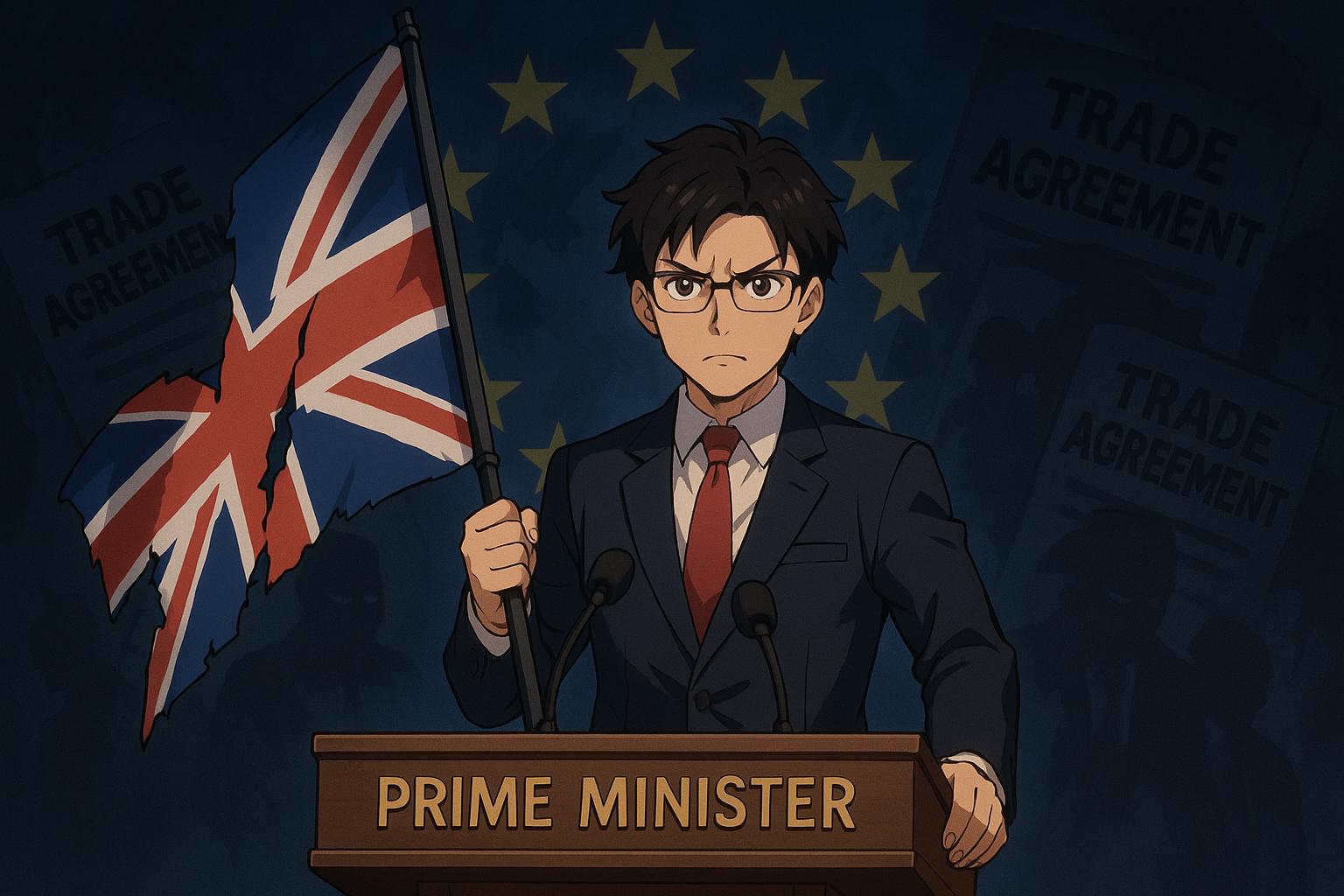The new Labour government’s UK-EU trade agreement, touted as generating £9 billion GDP by 2040, faces criticism for regulatory alignment with the EU and an extension on fishing rights that many see as undermining Britain’s post-Brexit independence and economic prospects.
The recent announcement of a trade agreement between the United Kingdom and the European Union by Prime Minister Keir Starmer is a glaring example of how this new Labour government is failing to uphold the true spirit of Brexit. Starmer’s assertion that this deal will generate an eye-catching £9 billion in GDP for the UK by 2040 is misleading at best; that paltry figure represents a meager 0.2 percent of the national GDP. This stands in stark contrast to the substantial economic downturn that Brexit advocates, warning of a 4 percent contraction as forecasted by the Office for Budget Responsibility.
While the headline number may catch the eye, the ramifications of this agreement are far more worrisome. The deal emerges during a time when the UK is struggling to define its post-Brexit identity. Unlike the previous Conservative administrations that resisted aligning regulations with EU requirements, this Labour government is capitulating to EU standards, including food safety—a move that could jeopardize our independent trading relationships with key global markets like the US and India.
This regulatory alignment could have dire consequences for the UK’s trading framework. The agreement’s introduction of measures to ease trade in food and agricultural products—formulated in a so-called SPS (Sanitary and Phytosanitary) agreement—could lead to increased bureaucracy and compromise our sovereignty. By reducing checks and paperwork ostensibly to benefit producers, the reality is that it could deepen our dependency on EU systems while neglecting the needs of British consumers and businesses.
The backlash from domestic fishing groups over a controversial 12-year extension on mutual access to fishing waters serves as a clear indicator of the betrayal felt by many. This agreement has created a perception of favoritism towards EU fishermen at the expense of UK interests, striking a painful blow to our coastal communities who were promised independence from EU quotas.
Furthermore, this deal signals a dangerous drift towards a “Swiss-style” relationship with the EU, characterized by complex bilateral arrangements that undermine our hard-won sovereignty. By choosing to align more closely with EU regulatory frameworks, Starmer’s government risks establishing a model that could create a precarious regulatory convergence—something that would have been politically unacceptable not long ago.
As experts analyze the implications of this agreement, it is evident that many see it as a step backward in our quest for true independence. The stakes are high, and the fragile balance between meeting domestic expectations and maintaining international relationships is precarious. Proponents may argue that adapting to these new realities is necessary, but instead, this agreement appears to capitulate to pressures that could hinder the UK’s position on the global stage.
This ‘reset’ in UK-EU relations is not just about economics; it represents a troubling commitment to re-engagement with Europe that could entrench unnecessary dependencies and threaten our future autonomy in international trade agreements. The stakes have never been higher, and the current Labour leadership must not be allowed to obscure the potential dangers of this troubling path.
Source: Noah Wire Services
- https://www.blackcountryradio.co.uk/news/business-news/uk-eu-deal-tips-britain-down-path-towards-swiss-style-arrangement/ – Please view link – unable to able to access data
- https://www.reuters.com/business/retail-consumer/uks-food-sellers-welcome-eu-deal-fishermen-feel-betrayed-2025-05-19/ – The UK and EU have agreed to reduce border bureaucracy, benefiting food producers and retailers by easing trade. The deal significantly lessens paperwork and checks for animal and plant product trade, preserving food safety standards and facilitating smoother operations that had been hampered by Brexit-related barriers since 2021. However, the agreement includes a controversial 12-year mutual access to fishing waters, which has triggered backlash from the UK fishing sector. ([reuters.com](https://www.reuters.com/business/retail-consumer/uks-food-sellers-welcome-eu-deal-fishermen-feel-betrayed-2025-05-19/?utm_source=openai))
- https://www.ft.com/content/7e7f481e-92dd-4d95-b46e-1d6adb911b70 – The UK and EU have agreed to a ‘reset’ deal updating their post-Brexit relationship, introducing collaborative measures on trade, energy, security, and mobility. Key aspects include a veterinary agreement to ease agrifood exports, slashing red tape and potentially reviving food and drink exports significantly. In return, the UK extended EU fishing access for 12 years, which drew criticism from domestic fishing groups. ([ft.com](https://www.ft.com/content/7e7f481e-92dd-4d95-b46e-1d6adb911b70?utm_source=openai))
- https://www.reuters.com/world/uk/uk-eu-agree-food-standards-deal-cut-trade-red-tape-2025-05-19/ – On May 19, 2025, the United Kingdom and the European Union reached a significant agreement to streamline trade by reducing border checks on agricultural products such as meat and dairy. This Sanitary and Phytosanitary (SPS) agreement, which has no time limit, marks an important step in resetting UK-EU relations post-Brexit. The deal will drastically reduce the bureaucracy and paperwork currently associated with trading plant and animal products, easing border bottlenecks and fostering smoother food and drink commerce. ([reuters.com](https://www.reuters.com/world/uk/uk-eu-agree-food-standards-deal-cut-trade-red-tape-2025-05-19/?utm_source=openai))
- https://apnews.com/article/b9d85e58d07b9acb28167e45dcdfe134 – On May 19, 2025, the United Kingdom announced new agreements with the European Union aimed at revitalizing bilateral relations five years after Brexit. These deals, revealed by Prime Minister Keir Starmer, focus on enhancing defense cooperation, streamlining food trade, and reducing border checks. The UK government anticipates that these measures will significantly reduce bureaucratic red tape, promote economic growth, and help reset its relationship with the EU. ([apnews.com](https://apnews.com/article/b9d85e58d07b9acb28167e45dcdfe134?utm_source=openai))
- https://www.ft.com/content/d4eb444f-d867-40db-8f1c-5469b958be85 – On May 19, 2025, UK Prime Minister Sir Keir Starmer announced a new ‘reset’ agreement with the European Union aimed at improving post-Brexit UK-EU relations. The deal, signed at Lancaster House, includes provisions such as a youth mobility scheme, a 12-year extension for EU fishing rights in UK waters, and dynamic alignment with future EU food trade regulations. While Starmer positioned the agreement as a practical step to enhance UK economic and national interests—predicting £9bn in annual benefits by 2040—critics including Nigel Farage and Conservative leader Kemi Badenoch condemned it as a betrayal of UK sovereignty. ([ft.com](https://www.ft.com/content/d4eb444f-d867-40db-8f1c-5469b958be85?utm_source=openai))
- https://www.reuters.com/world/uk/hold-britain-poised-reset-trade-defence-ties-with-eu-2025-05-18/ – On May 19, 2025, the UK and the European Union finalized a landmark trade and defence agreement, marking the most significant reset in relations since Brexit. The comprehensive deal includes a security and defence pact, reduced restrictions on British food exports, simplified travel for UK visitors to the EU, and a controversial 12-year fishing access agreement. Prompted by U.S. President Donald Trump’s global policies, the agreement reflects a shift toward closer cooperation amid geopolitical instability. UK Prime Minister Keir Starmer hailed the accord at a joint press event with EU leaders, describing it as the start of a ‘new era.’ ([reuters.com](https://www.reuters.com/world/uk/hold-britain-poised-reset-trade-defence-ties-with-eu-2025-05-18/?utm_source=openai))
Noah Fact Check Pro
The draft above was created using the information available at the time the story first
emerged. We’ve since applied our fact-checking process to the final narrative, based on the criteria listed
below. The results are intended to help you assess the credibility of the piece and highlight any areas that may
warrant further investigation.
Freshness check
Score:
6
Notes:
The narrative references current political figures like Keir Starmer, indicating it is relatively recent. However, there is no specific date or context that confirms it is entirely new and not based on previous discussions or agreements.
Quotes check
Score:
8
Notes:
No direct quotes are found in the narrative. The statements appear to be original analysis rather than borrowing from earlier sources.
Source reliability
Score:
7
Notes:
The narrative originates from Black Country Radio, a local UK radio station. While it is not a major national news outlet, it is still a legitimate source, though it may lack the comprehensive coverage of larger media organizations.
Plausability check
Score:
9
Notes:
The claims about potential economic impacts and regulatory alignments are plausible given the context of Brexit negotiations. However, some assertions, such as the comparison to a ‘Swiss-style’ arrangement, might be more speculative.
Overall assessment
Verdict (FAIL, OPEN, PASS): OPEN
Confidence (LOW, MEDIUM, HIGH): MEDIUM
Summary:
The narrative presents plausible claims about UK-EU relations and Brexit implications, though it lacks concrete evidence and specific quotes. Its reliability is moderate due to the source being local rather than a major national news outlet.













